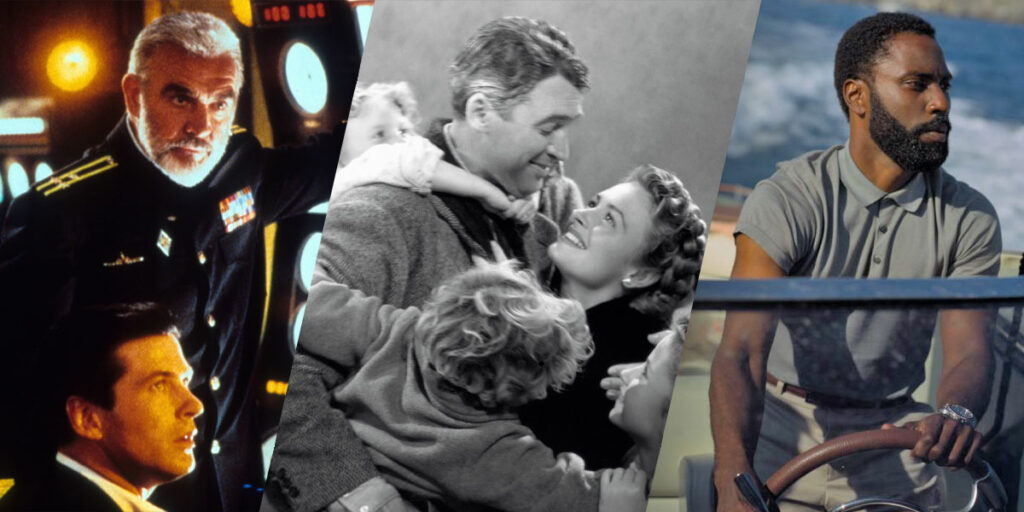Sometimes a film that’s losing me for a while can come around and totally win me over. Here are some examples in 10 films that get better as they go on!
I’ve had a lot of instances where I’m watching a film and, for any number of reasons, I’m not getting as into it as I would like. Whether I’m finding myself indifferent to it or outright disliking it, there would be a point where I’m almost certain that the movie simply isn’t for me … the key word there being almost. Because then, whether gradually or in an instant, some new wrinkle or development would come along and drastically improve my opinion on what I’m watching, and a film I that was leaning negatively towards as late as halfway through would end up being a worthwhile experience. Sometimes I even end up looking at the parts I didn’t like in a newer, better light when I have the full context.
I find that aspect of storytelling fascinating, and I want to celebrate such a phenomenon by listing ten films that, on first viewing, got better for me as they went along. Some recovered from flimsy starts, while others revealed hidden depths that retroactively improved scenes I didn’t like. I’m sure many of these choices will be surprising. Maybe you always loved all of these movies all the way through, or maybe you found them to not get better as they progress. But from my own personal experience, these are ten movies that weren’t shaping up to be that good for a while, but ultimately came through and won me over. So, let’s count down 10 films that get better as they go on!
10. GUARDIANS OF THE GALAXY VOL. 2
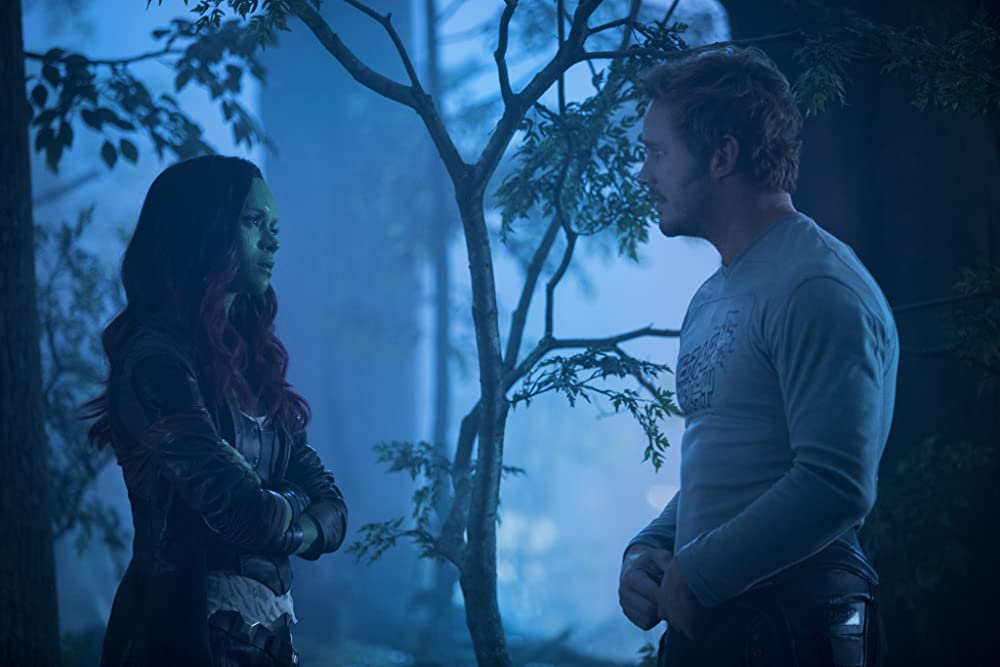
I’m putting this Marvel Cinematic Universe film at the bottom of the list because at no point did I ever not find it at the very least enjoyable. But on my first viewing of the film, the first hour or so didn’t feel like it had much of a direction. The titular Guardians Peter Quill, Gamora, and Drax (Chris Pratt, Zoe Saldana, Dave Bautista) are simply spending time on the planet of Quill’s father (Kurt Russell) – or the planet that is his father, it’s a long story – while on the run from a group of villains that only sparsely shows up, while Rocket (Bradley Cooper), Groot (Vin Diesel), and Yondu (Michael Rooker) are trying to escape from a Yondu’s former gang in a B plot that seems largely irrelevant to everything else. It’s all fun and contains great humor, but it was hard to discern any sense of drive or purpose to the story, which, combined with the slower pacing compared to the first Guardians, makes Vol. 2 initially seem like it’s going to be an inferior sequel to the original.
But the further on we go, the more the film begins to show that these seemingly disparate threads and character beats do all tie into one another in a really impactful way. Every character ends up digging into some aspect of their psyche, all of which unexpectedly revolves around the nature of egos, toxic masculinity, emotional scarring, and the roles of family. Quill is nearly taken down by the pride of his true lineage, Yondu’s fatherly heart puts him at odds with his former crew, and one character even turns out to be a metaphorical manifestation of destructive self-indulgence. The film’s most dramatic and heavy-hitting scenes sneak up on you because of the earlier work in setting them up without you even realizing it, and a movie that I initially was finding decent ended up being my favorite MCU film of all time. By weaving a thematic web right under our noses, Guardians of the Galaxy Vol. 2 is a deceptively smart and emotional comic book movie the likes of which I don’t think anyone, even fans of the first film, expected.
9 . THE GODFATHER

I have a hit-and-miss relationship regarding crime dramas where the main characters are the criminals, especially if we’re supposed to be invested in said criminals. How do you take people who do terrible things and have us sympathize with them or even root for them? This is what I initially thought would be my dilemma through the early portion of The Godfather. Despite it being widely seen as an all-time great film, I went through a good portion of it liking it fine, yet not understanding why I should care about the plights of the Corleone mobster family. They’re obviously violent, terrible people, and the film never seems to be glorifying anything they did, so when the seemingly decent Michael Corleone (Al Pacino) is brought into the fold in the wake of escalating conflicts, I couldn’t find myself really caring if he one-upped the people responsible for the attacks on his family. It was the one hurdle I was facing in an otherwise good experience.
But it’s around the point that Michael vows to enter the “family business” and make it legitimate that I realized that this entire time, we haven’t been watching him fight through his family’s corruption; we’ve been watching him give into it. The same blood that corrupted his family turns out to be a far bigger part of him than he realizes, and once he gets a taste of power and revenge, he slowly but surely digs deeper into it until he’s the very thing he once swore he would never be. My favorite part of all this is that he constantly maintains that he’s still above the evil of his kin, yet his actions are so opposed to that notion that we realize that he’s trying to fool either his wife (Diane Keaton), himself, or both. I honestly didn’t think that the Michael Corleone of the start of the film would end up the way he does, which let the film slowly catch me off-guard. For me, this is the biggest part of what makes The Godfather such a subtly tragic hallmark of cinema.
8. STAR WARS: RETURN OF THE JEDI
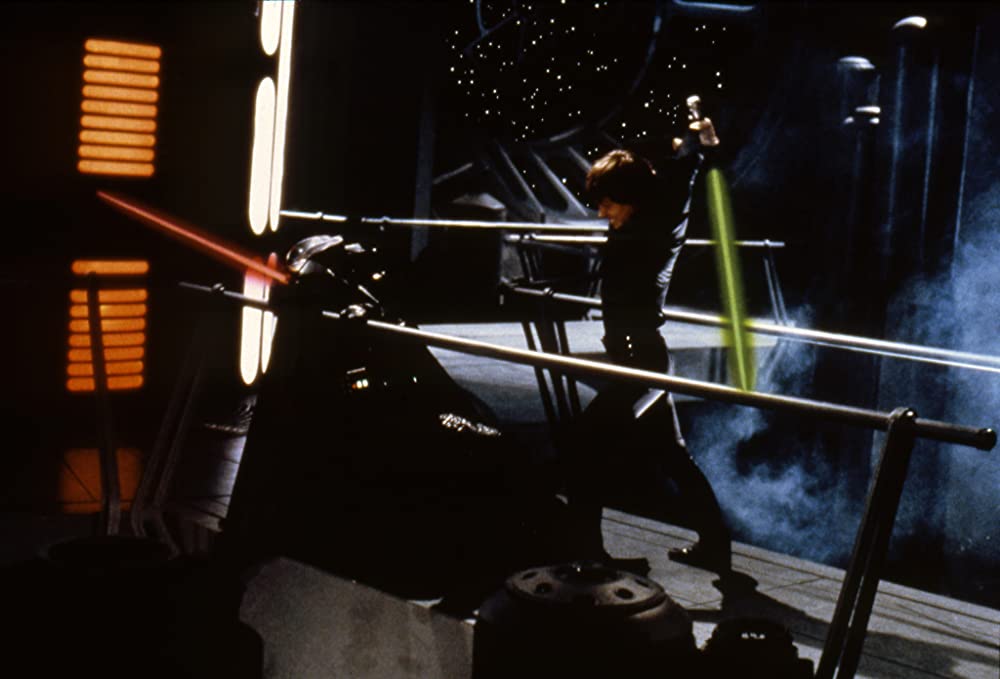
This concluding chapter of the original Star Wars trilogy ends a three-film story on a pretty fulfilling note … but man, did it not start that way. The Empire Strikes Back, in one of the biggest cinematic cliffhangers of all time, has Darth Vader (James Earl Jones) revealed as Luke’s father and Han Solo (Harrison Ford) taken to Jabba the Hutt. The former is by far what I was most excited to see followed up in Return of the Jedi … which is why it’s very jarring to see the entirety of the first act devoted solely to rescuing Han, all while literally none of the drama surrounding Luke (Mark Hammill), Vader, the Jedi, or the Empire’s latest plans is addressed outside of the opening scene. The Tatooine rescue is fun and all, but it feels like a completely different movie from what comes after, and it’s odd that the film didn’t find some way to incorporate it more with all the other plot points. The treatment of this particular cliffhanger resolution as a detour before the real story begins does not start Return of the Jedi off on the best foot.
Thankfully, when we do get to the true plot of Return of the Jedi, particularly Luke’s side of it, things pick up considerably. The further the film goes after the first act, the more entrenched we are in the fight for Vader’s soul between Luke and the Emperor (Ian McDiarmid), and it’s every bit as tense and enthralling as I wanted it to be. Even the battles around them, though not perfectly done, are still a lot more fun when they feel actually relevant to the bigger picture. It’s a shame that Return of the Jedi couldn’t resolve everything in a more cohesive way, but it at least saves its best material for later and sticks the landing in the end.
7. IT’S A WONDERFUL LIFE
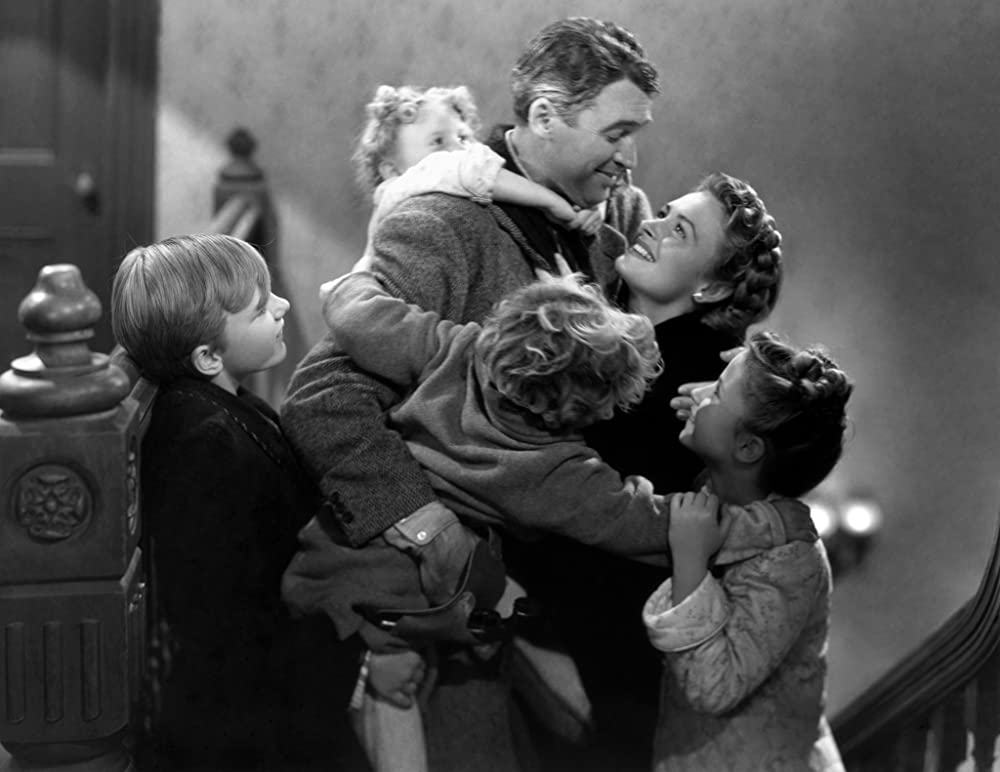
We all know the setup of It’s a Wonderful Life. George Bailey (James Stewart) finds himself increasingly down on his luck and wonders what the world would be like if he was never born, and so an angel (Henry Travers) is sent down to show him such a world and make him realize that he does indeed have a wonderful life … though that doesn’t happen until the last forty minutes. Until then, the film is mostly just George Bailey going through life and dealing with bank troubles. I initially found the first half of this film good but a little underwhelming, mainly because I didn’t find George’s life particularly fascinating. It’s a nice exploration who this man is and his relationships with everyone else, but I still found myself wondering why it was taking so long to get to the famous what-if-you-were-never-born scenario.
Ironic that I fell right into the trap that George did: not recognizing just how precious all of these moments and people are in making George’s life so special. Every piece is so perfectly set in place right from the start for George to have his beautiful epiphany little by little, and the progression of his frustrations is so much easier to see in hindsight. It’s a Wonderful Life plays the long game in getting us to the core of its story, but it needed to do so in order to properly get its point across. We feel George’s despair as he sees the world without him because we know so clearly how much everything means to him, even if he himself didn’t initially realize it. The end result gets me in tears every time, and that probably wouldn’t be the case had we not gotten to know the life we’re looking at. On each subsequent viewing, I learn to appreciate more and more of the interactions and little accomplishments of George’s life, and how much they all add up.
6. TENET
Though the reception to Tenet is overall more positive than negative, many have called this 2020 blockbuster – one of the only 2020 blockbusters – among Christopher Nolan’s weaker films. I’m honestly inclined to agree, mainly due to how much better the second half is than the first half. Nolan usually knows how to combine complex, brain-scrambling ideas with compelling characters and emotionally-charged storylines, but Tenet doesn’t have a fair deal of the latter. This wouldn’t be much of an issue had it not been for the reams of cold, complicated exposition that make up a huge bulk of the storytelling. It’s mainly the action and visuals that kept me going through that initial stretch.
However, Tenet’s main selling point is the method of people and objects being inverted through time, and yet the first half primarily moves in one temporal direction. Once that direction is reversed, blanks start filling in, and the overall story becomes much more fascinating, even retroactively making previous sequences better for how they come back into play. Where many scenes didn’t initially seem to have a ton of importance outside of getting across information, they’re given much more relevance once the inversion curtain is pulled back and we see that Tenet is using them for so much more. It’s just so cool to see the forward and backward movements of time intersecting, which even ties into solid character arcs in ways that are more familiar to a Nolan film. Plus, when the inversions make their way into the action, it generates some of the most stunning imagery in years. The climax is incredible, constantly jaw-dropping, and ends with a heavy gut-punch involving the two main characters. In a film where time is perceived in two directions, it’s fitting that we can’t judge the whole thing until we see where both directions go.
5. LUCA
The premise of Luca on paper had me worried before I saw the film. It seemed like it would house a lot of tired clichés that I’m sick of, especially from Disney. It’s about a sea monster boy (Jacob Tremblay) who lives underwater but yearns to see what’s on the surface. He defies his strict, overly-protective parents to do so, who then find out and overreact, alienating him from them … that all sounds like a Little Mermaid rip-off, doesn’t it? Indeed, all of these tropes are present and not very interesting. The characters feel like they’re just serving their purposes and little else, the story is highly unoriginal, and it all goes by so quickly that it sometimes feels like it’s on autopilot … But all of that is pretty much over and done with after the first act.
Once they’re out of the way and Luca finally gets to stay on land, this Pixar film becomes its own thing entirely. Gone is the melodrama we’ve seen done to death, replaced by Luca and his new friend Alberto (Jack Dylan Grazer) exploring this new world, chasing their dreams, and slowly realizing that those dreams are evolving to something different and learning to reconcile with that. Luca after its first act is like Pixar’s version of a Miyazaki movie like Kiki’s Delivery Service, trusting that smaller stakes and more intimate desires are interesting enough to carry our investment. Even things like the family searching for Luca are much more tolerable when they’re pushed to the side. It’s hard to fault the film for handling its opening like it did. This story kind of demands those tropes be in there, but it would be dull to spend too much time on them, justifying their rushed nature. I’ll gladly take Luca’s trade-off of an unoriginal initial stretch in order to get something as original as the rest of it.
4. THE HUNT FOR RED OCTOBER
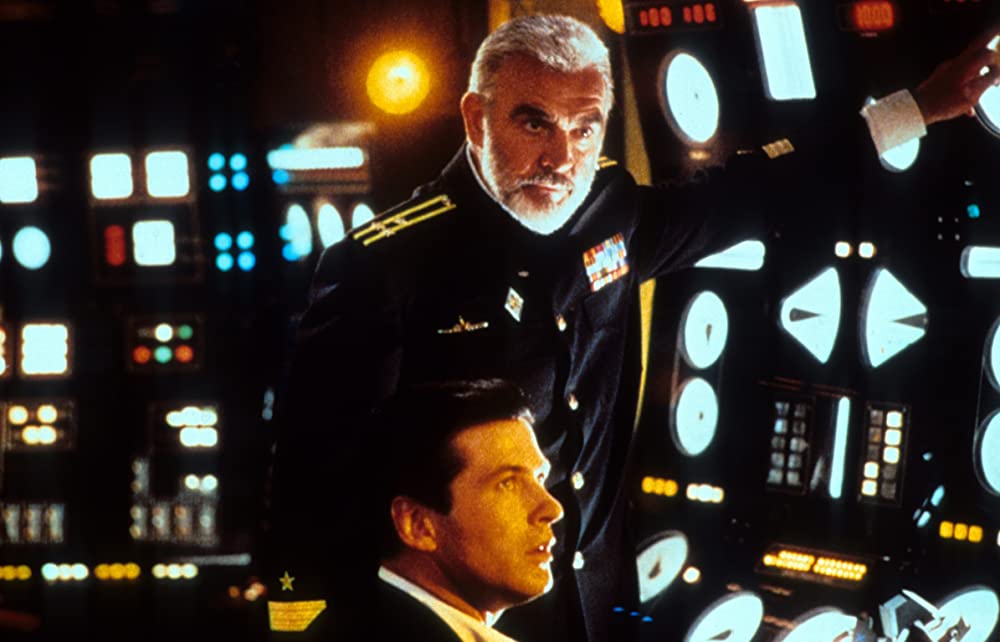
The Hunt For Red October, a story about a Soviet submarine called the Red October heading for the U.S. coast and sparking tension among the American government and CIA, is one of John McTiernan’s most highly-regarded films. But it took a really long time for me to understand why. The first few scenes start things off on great footing, but the remainder of the first hour was not grabbing me at all. Nothing stood out as particularly bad in the slightest, but I felt surprisingly little sense of building tension, meat in the writing, or insight into the characters. None of it is absent, but it’s all pretty aimless, with the only looming threat coming from a submarine that’s mostly shown only when it’s underwater and not really doing anything. Visually, it’s lacking, and not much of interest happens to make up for it, causing many of these scenes to blur together for me. There’s still great filmmaking and a magnetic performance from Alec Baldwin, but they only barely kept me going.
Thankfully, once the two sides of the United States and the Soviet Union finally start coming together and interacting, The Hunt for Red October held my attention considerably better. As would be expected with McTiernan, the resulting high-octane sequences are excellently produced and thrillingly staged. But more prominently, I think the prolonged amount of time we spend with each side separated, while too long for me, does ultimately pay off when you see them finally together. It feels more special and satisfying to see everyone try to feel each other out, work out what the real threat is, and take resulting action. Baldwin and Sean Connery (who plays a possible Soviet defector) work excellently off each other, the climax is great, and the final scene caps things off very nicely. In the end, that second half makes The Hunt For Red October worth the watch, and the film narrowly comes out with its head held high enough for me.
3. THERE WILL BE BLOOD
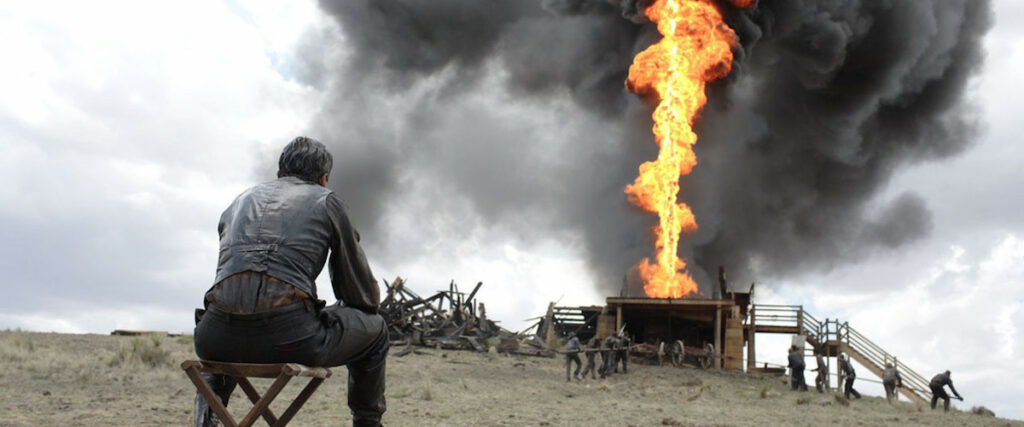
If you were to ask for my opinion on this Paul Thomas Anderson modern classic about halfway through, I would call it functional but little else. It just seemed like a pretty standard film about the oil industry and its dangers and dealings. Our main character Daniel Plainview (Daniel Day Lewis) seemed like your standard, semi-charming businessman simply trying to find success in a town rich with possibilities for his ventures, through means that seemed a little self-interested but not really shady to me. The story and characters were all fine, but not that interesting, and a few standout scenes aside – particularly the gas blowout with its impeccable lighting and score – I didn’t see much reason to care about what was happening or any deeper meaning being conveyed.
However, at a certain point, a different side of Plainview is made available to see, and I suddenly recognized that almost everything I’d been witnessing about him before had been a carefully constructed veneer, which is now slowly unravelling until it’s finally discarded when the circumstances pile up too high. From this point on, There Will Be Blood not only becomes far more compelling, but the earlier scenes suddenly have me thinking a lot more about what was lurking beneath them all along. The film shows how easy it is for those who are calculated and focused on greed to disguise their true intentions and prey on those who are not. It even managed to fool me, drilling in (no pun intended) how disturbing powerful, capital-driven deception can be. The line between what’s real and what’s a construct is suddenly so much more blurred, and that contrast caught me considerably off-guard in the best way possible. I imagine many others were stunned when this seemingly typical oil tycoon story turned into something so miserable and shocking. Not many films can pull off such a jarring turn, but There Will Be Blood thankfully has a lot more to offer when you go deeper than what appears on the surface.
2. GOOD WILL HUNTING
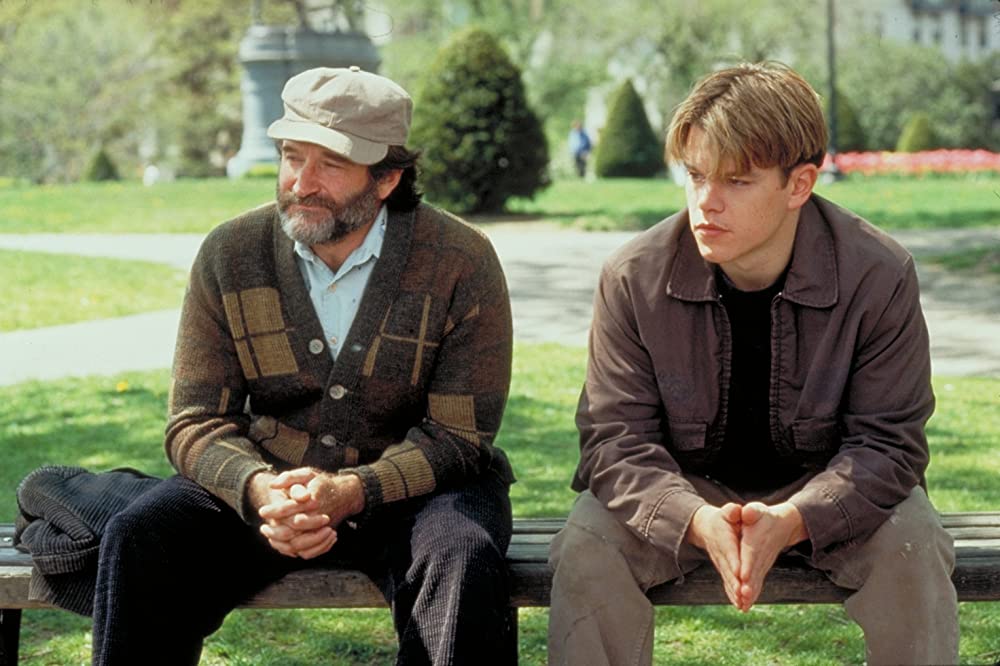
Good Will Hunting is one of the very rare movies that, scene by scene, start to finish, gets better as it goes along. I initially wasn’t clicking with it almost at all. Matt Damon plays Will, a young man who’s put in therapy to analyze his delinquent behavior. But for a while, we’re not shown much of why he’s so reckless and unwilling to help himself despite his clear talents, which was hard to swallow with how melodramatic and sappy the film was coming across. Even Will’s friends were a little unlikeable for a while, making it even harder for me to get on the wavelength the film clearly wanted me to be on.
But this misunderstanding is part of what makes Good Will Hunting so brilliant. As therapist Dr. Sean Maguire (Robin Williams) delves further into Will’s head and discovers the source of his self-destructive habits, so do we. And the more I learned about him, his past, and the nature of those around him who wish to “help” him without truly understanding him, the more I ended up feeling horrible that I ever called this kid unsympathetic. Like It’s a Wonderful Life, this film used my presumptions and perceptions against me to remind me how you can never truly understand the experiences of another person just by observing them. The topics also become serious enough and heartfelt enough that I found myself fully engrossed in what I once considered too “sappy” a tone. Good Will Hunting is one of the few films that I can say legitimately disarmed me as a viewer. It got under my skin without me realizing it, with characters unveiling layer after layer to bring them from mildly annoying to feeling achingly real. For a film I was initially worried I’d have to go against the grain on, it completely won me over as a marvelous juggernaut of a coming-of-age character drama.
1. YOUR NAME.

Of all the films on this list, Your Name. is the only one where, at one point, I was initially disliking it enough to almost turn it off. This anime film about a boy (Ryunosuke Kamiki) and girl (Mone Kamishiraishi) who find themselves switching bodies starts off seeming like it has no idea how to handle its premise. The presentation of the two characters’ lives made little sense. They were reacting way too casually to suddenly being in a new body, and the entire situation was being portrayed in an exclusively comedic manner with nothing to really latch onto. Add onto that a couple of stylistic choices like pop song montages that would be tolerable in a stronger film but were just adding extra fuel to the fire in this setting, and I had to convince myself to keep going after a little over half an hour in … So, how did I end up absolutely loving the film and finding myself in tears once it was over?
Your Name. turns out to be a very sneaky film. Soon after the first act, there’s a significant turn and a massive reveal of a far greater scope than what we were initially led to believe. As soon as these came about, pretty much everything that was confusing and frustrating me before suddenly made so much more sense and fell perfectly into place. Without giving these developments away, I’ll just say that the order in which we’re shown certain scenes is not necessarily the order in which they actually happen. Things are a lot more complicated and even a lot more spiritual, warping these characters’ perceptions of time and memory in ways that would even fool audience members like me. This is also when the emotion gets cranked up exponentially, with our two leads’ motivations evolving from practical desires to spiritual desires to spiritual necessities. Though I still think the first act could have been a little less cutesy, it’s so much easier to stomach when I know not only that there’s a lot more to the story, but that everything is taken to much deeper and even much more trippy places.
Your Name. is so much more than the shallow romantic comedy it made me think it was. It’s a story about two people exploring one another by literally stepping in their shoes as well as learning about their histories, only to then be challenged by the oppressive forces of time and memory as they struggle to keep their connection intact. It’s the only time so far where a movie I absolutely hated at one point became a movie I absolutely love. Any time I’m watching a movie and feeling way off its wavelength, it’s films like Your Name. that I keep in mind to make myself bear with it. And if there’s anything I’ve learned from these ten films, it’s that sometimes you really need to hear a story out entirely to see that what seemed nonsensical, messy, or underwhelming, is actually setting up something extraordinary.

